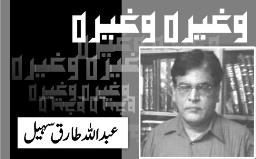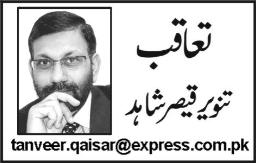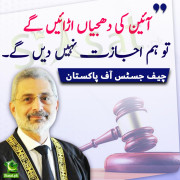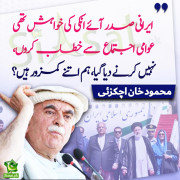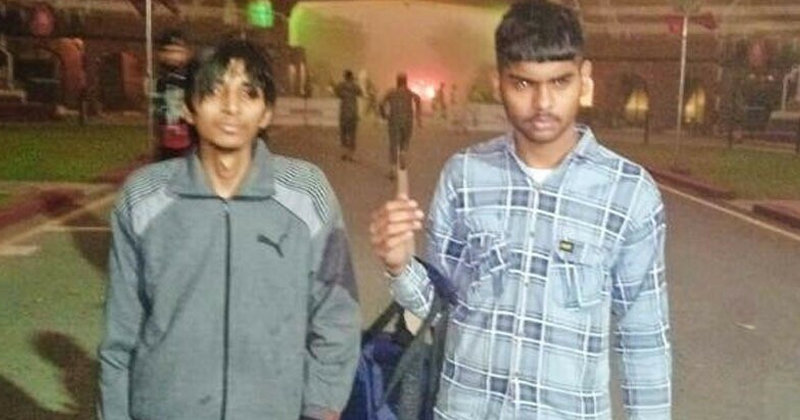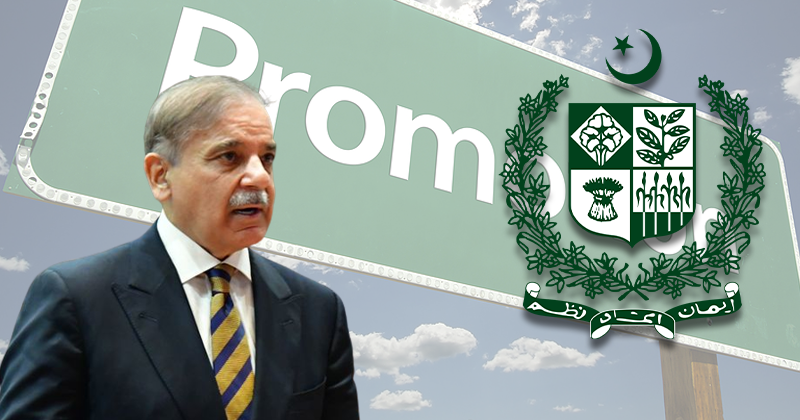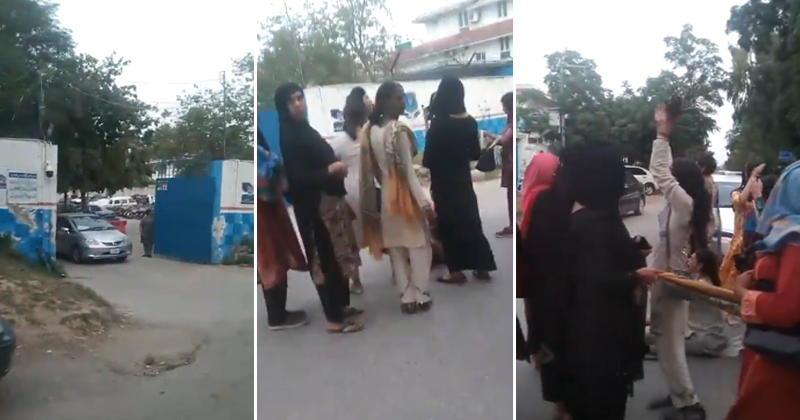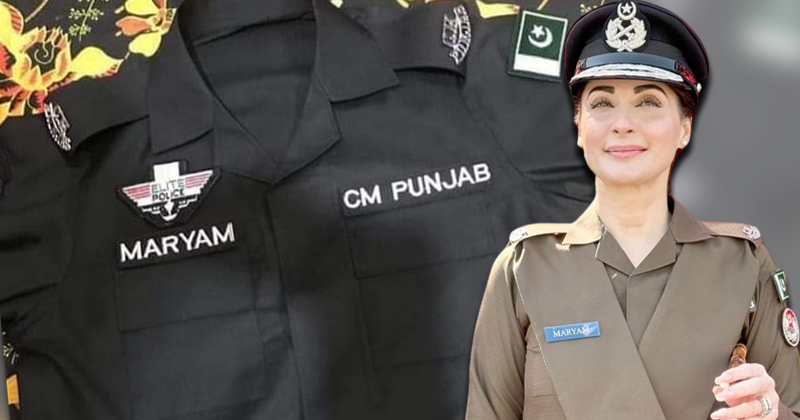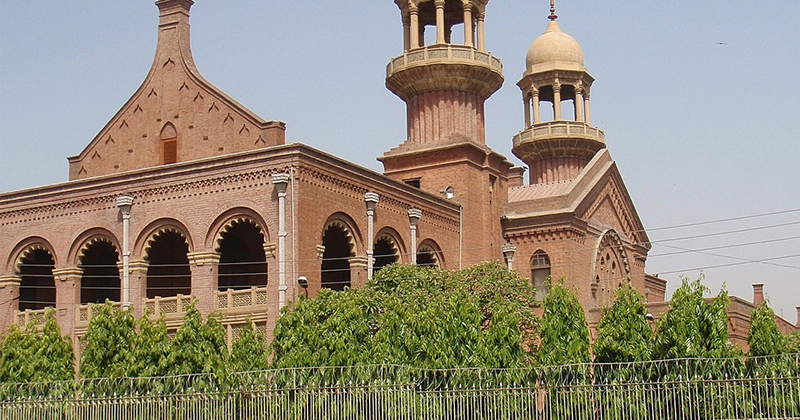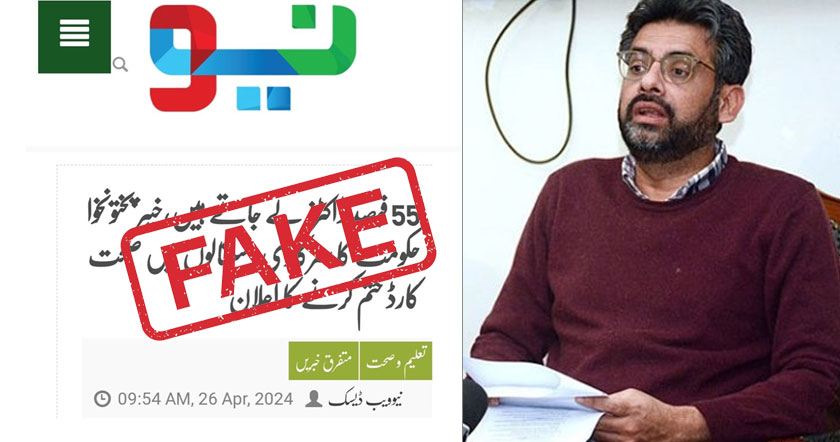A
You are using an out of date browser. It may not display this or other websites correctly.
You should upgrade or use an alternative browser.
You should upgrade or use an alternative browser.
Aaj key KAALAM 12 June, 2009
- Thread starter arshad_lahore
- Start date
- Promote your thread
More options
Promote your thread
A
arshad_lahore
Guest
A
arshad_lahore
Guest
A
arshad_lahore
Guest
A
arshad_lahore
Guest
A
arshad_lahore
Guest
A
arshad_lahore
Guest
A
arshad_lahore
Guest
A
arshad_lahore
Guest
A
arshad_lahore
Guest
A
arshad_lahore
Guest
A
arshad_lahore
Guest
A
arshad_lahore
Guest
A
arshad_lahore
Guest
A
arshad_lahore
Guest
A
arshad_lahore
Guest
Leadership
Islamabad diary
Friday, June 12, 2009
Ayaz Amir
Leadership is not part-timism. It is a single-minded vocation that brooks no rivals and indeed can co-exist with no distractions. You can't be into business deals and kickbacks and the other pursuits that define leadership in a country such as Pakistan and yet lay claim to honest leadership. It just doesn't happen that way.
The thought of property acquisition, plots and flats here and there, nest-eggs in London and New York, hobnobbing with property tycoons and other shady characters, are no part of leadership.
M A Jinnah, M K Gandhi, Jawaharlal Nehru were titans who lived politics and were consumed by politics. They were very much men of the world but in a sense other-worldly too in that what they cared about the most were idealistic things, things of the mind and the spirit. (He ne'er is called to immortality, wrote Keats, who fails to follow where airy voices lead.) Ordinary men could not have written what Gandhi and Nehru did. An ordinary man could not have delivered the speech that Jinnah did in the Constituent Assembly on Aug 11, 1947.
Here was a man who had led the fight for a separate homeland for the Muslims of the sub-continent on the basis of Muslim separatism. Yet at the very moment of his triumph he was exhorting his countrymen to leave the past behind and transcend the foundations of Partition.
Pakistanis try to impose a supernatural consistency on Jinnah's political life. They are wrong. He was first a Congressite nationalist, then a Muslim separatist but when the goal for which he had struggled was on the very point of consummation he tried to sketch out another template for the future of the country he was founding.
Did Mustafa Kamal, Father of the Turks, leave behind any material possessions? His life was devoted first to his military career, in which he excelled, winning renown in the battle of Gallipoli where he was the senior Turkish commander; and then to the cause of Turkish independence. He was fond of drinking, and drank at times to excess, justifying it on the grounds that it was good for his chronic constipation (doctors of digestive disorders may kindly take note).
There's no point in beating about the bush. He was also fond of women. (At times he was also fond of other things but let's not get into that). Asked once as to what was the quality he admired most in women, his wry answer was, "Availability" -- a sentiment sure to outrage feminists and other stalwarts of the various women's movements. But all these proclivities were subordinate to the one overriding passion which dominated his waking hours, and perhaps even his dreams: Turkey's rebirth and redemption after the chaos and humiliation of Ottoman decline and fall.
Lenin, Stalin, Mao: all of them driven souls, single-minded individuals, their lives dominated by one passion alone, revolution. All three were voracious readers; autodidacts all their lives. Lenin as Soviet leader often read dictionaries for relaxation. Stalin wrote poems (some surprisingly good) and read books on history and biography all the time. Mao as Chinese leader practically lived in his library. He had an oversized bed strewn with books and it was on the same bed that he consorted with the regular stream of female comrades arranged by his helpful bodyguards to help lighten his loneliness.
Philip Short's excellent biography of Mao has this to say about the bed and its occasional occupants: "The tradition of Saturday night dances in Yan'an (during the Long March) had survived the move to Zhongnanhai (in Beijing after the communists had come to power). From the dance floor, Mao and his young partners would gravitate to his study beside the pile of books stacked on his vast bed. The girls came from dance troupes organised by the cultural division of the PLA (Peoples Liberation Army), chosen both for their looks and their political reliability."
One of the things sadly missing in the Pakistan army: it has no cultural division.
When the German army was close to Moscow in October 1941 there was panic in the city and plans were made for its evacuation. A train had been prepared specially for Stalin. Here from Montefiore's excellent life of Stalin: "Stalin hesitated for two long days. No one knows his exact movements but he no longer appeared in his office. At the height of the legendary struggle for Moscow the Supremo actually dossed down in his greatcoat on a mattress in the subterranean halls of the Metro, not unlike an omnipotent tramp."
And where did the Supremo sleep? In a small space sealed off from running trains by plywood. A space also was created for his use as an office: "Passing trains caused pages to fly so they were pinned to desks. After working all day in his subterranean offices, Stalin would finally stagger over to his sleeping compartment in the early hoursIt is hard to imagine any of the other warlords living in such a way but Stalin was accustomed to dossing down like the young revolutionary he once was."
And then Stalin decided that Moscow would not be abandoned. When the Politburo seemed to be in two minds he asked his housekeeper, also rumoured to be his mistress, "Valentina Vasilevna, are you preparing to leave Moscow?" "Comrade Stalin," she answered, "Mother is our Mother, our home. It should be defended." And that was that.
Not only was Moscow not abandoned, Stalin, to the astonishment of his colleagues, also decided that the traditional Revolution Day parade on November 7 would be held. "I'll see to it personally. If there's an air raid during the parade and there are dead and wounded, they must be quickly removed and the parade allowed to go on. A newsreel should be made and distributed throughout the country. I'll make a speech"
The parade and speech can be seen on YouTube. The speech is just six and half minutes long, delivered in a very calm manner with no poetic or rhetorical flourishes whatever. But it says everything there is to say and leaves a deep impression.
We all know the last part of Churchill's speech we shall fight on the beaches and so onbut we shall never surrender. But the entire speech is a masterpiece, an account of the lost battle of France -- almost a dispassionate account in which he also brings himself to say that the Germans are a brave race -- and when it reaches its climax one can feel the hair rising on one's back.
Churchill was the son of a lord but he had no private income and when not holding political office lived all his life from the money he derived from his books and newspaper writings. He lived the life of a highborn aristocrat but this was sustained by his pen.
When Clement Attlee stepped down as British prime minister he had to take to newspaper writing to support himself. Harold Wilson had no private income. Lord Wavell as viceroy of India had no house of his own in England and had to buy one when he returned from India.
The current scandal over MP expenses in Westminster tells an altogether different story but this is now and that was then.
Ordinary times call for ordinary leaders, leaders who are competent managers rather than inspirational figures in the Churchill or Stalin mould. But in Pakistan we are living through extraordinary times, with wars within and menacing pressures outside, a situation calling for leadership of a high calibre, to inspire the nation and summon it to action.
Criticism is easy and it is also easy to give way to despair but we should not lose heart. Other nations have been through worse times and while the weak have perished those with some strength in them have emerged successful from their trials. We have our weaknesses and failures but also our strengths and successes. The ordeal we are going through was perhaps necessary. We will be a better people once we pass this test.
Tailpiece: Consider Stalin's decision not to evacuate Moscow and then consider the PML-N's decision to have the by-elections in Rawalpindi and Lahore postponed because of the law and order situation. Is this the way to fight terrorism? No worse message could have been sent about the party's stewardship of Punjab. Even if the threat of terrorism was a hundred times worse, the elections should have gone ahead. Even now it is not too late to make amends. A fresh application must be made to the Election Commission and the elections should be held as scheduled. Or else we might as well make our peace with Maulana Fazlullah and Baitullah Mahsud.
Islamabad diary
Friday, June 12, 2009
Ayaz Amir
Leadership is not part-timism. It is a single-minded vocation that brooks no rivals and indeed can co-exist with no distractions. You can't be into business deals and kickbacks and the other pursuits that define leadership in a country such as Pakistan and yet lay claim to honest leadership. It just doesn't happen that way.
The thought of property acquisition, plots and flats here and there, nest-eggs in London and New York, hobnobbing with property tycoons and other shady characters, are no part of leadership.
M A Jinnah, M K Gandhi, Jawaharlal Nehru were titans who lived politics and were consumed by politics. They were very much men of the world but in a sense other-worldly too in that what they cared about the most were idealistic things, things of the mind and the spirit. (He ne'er is called to immortality, wrote Keats, who fails to follow where airy voices lead.) Ordinary men could not have written what Gandhi and Nehru did. An ordinary man could not have delivered the speech that Jinnah did in the Constituent Assembly on Aug 11, 1947.
Here was a man who had led the fight for a separate homeland for the Muslims of the sub-continent on the basis of Muslim separatism. Yet at the very moment of his triumph he was exhorting his countrymen to leave the past behind and transcend the foundations of Partition.
Pakistanis try to impose a supernatural consistency on Jinnah's political life. They are wrong. He was first a Congressite nationalist, then a Muslim separatist but when the goal for which he had struggled was on the very point of consummation he tried to sketch out another template for the future of the country he was founding.
Did Mustafa Kamal, Father of the Turks, leave behind any material possessions? His life was devoted first to his military career, in which he excelled, winning renown in the battle of Gallipoli where he was the senior Turkish commander; and then to the cause of Turkish independence. He was fond of drinking, and drank at times to excess, justifying it on the grounds that it was good for his chronic constipation (doctors of digestive disorders may kindly take note).
There's no point in beating about the bush. He was also fond of women. (At times he was also fond of other things but let's not get into that). Asked once as to what was the quality he admired most in women, his wry answer was, "Availability" -- a sentiment sure to outrage feminists and other stalwarts of the various women's movements. But all these proclivities were subordinate to the one overriding passion which dominated his waking hours, and perhaps even his dreams: Turkey's rebirth and redemption after the chaos and humiliation of Ottoman decline and fall.
Lenin, Stalin, Mao: all of them driven souls, single-minded individuals, their lives dominated by one passion alone, revolution. All three were voracious readers; autodidacts all their lives. Lenin as Soviet leader often read dictionaries for relaxation. Stalin wrote poems (some surprisingly good) and read books on history and biography all the time. Mao as Chinese leader practically lived in his library. He had an oversized bed strewn with books and it was on the same bed that he consorted with the regular stream of female comrades arranged by his helpful bodyguards to help lighten his loneliness.
Philip Short's excellent biography of Mao has this to say about the bed and its occasional occupants: "The tradition of Saturday night dances in Yan'an (during the Long March) had survived the move to Zhongnanhai (in Beijing after the communists had come to power). From the dance floor, Mao and his young partners would gravitate to his study beside the pile of books stacked on his vast bed. The girls came from dance troupes organised by the cultural division of the PLA (Peoples Liberation Army), chosen both for their looks and their political reliability."
One of the things sadly missing in the Pakistan army: it has no cultural division.
When the German army was close to Moscow in October 1941 there was panic in the city and plans were made for its evacuation. A train had been prepared specially for Stalin. Here from Montefiore's excellent life of Stalin: "Stalin hesitated for two long days. No one knows his exact movements but he no longer appeared in his office. At the height of the legendary struggle for Moscow the Supremo actually dossed down in his greatcoat on a mattress in the subterranean halls of the Metro, not unlike an omnipotent tramp."
And where did the Supremo sleep? In a small space sealed off from running trains by plywood. A space also was created for his use as an office: "Passing trains caused pages to fly so they were pinned to desks. After working all day in his subterranean offices, Stalin would finally stagger over to his sleeping compartment in the early hoursIt is hard to imagine any of the other warlords living in such a way but Stalin was accustomed to dossing down like the young revolutionary he once was."
And then Stalin decided that Moscow would not be abandoned. When the Politburo seemed to be in two minds he asked his housekeeper, also rumoured to be his mistress, "Valentina Vasilevna, are you preparing to leave Moscow?" "Comrade Stalin," she answered, "Mother is our Mother, our home. It should be defended." And that was that.
Not only was Moscow not abandoned, Stalin, to the astonishment of his colleagues, also decided that the traditional Revolution Day parade on November 7 would be held. "I'll see to it personally. If there's an air raid during the parade and there are dead and wounded, they must be quickly removed and the parade allowed to go on. A newsreel should be made and distributed throughout the country. I'll make a speech"
The parade and speech can be seen on YouTube. The speech is just six and half minutes long, delivered in a very calm manner with no poetic or rhetorical flourishes whatever. But it says everything there is to say and leaves a deep impression.
We all know the last part of Churchill's speech we shall fight on the beaches and so onbut we shall never surrender. But the entire speech is a masterpiece, an account of the lost battle of France -- almost a dispassionate account in which he also brings himself to say that the Germans are a brave race -- and when it reaches its climax one can feel the hair rising on one's back.
Churchill was the son of a lord but he had no private income and when not holding political office lived all his life from the money he derived from his books and newspaper writings. He lived the life of a highborn aristocrat but this was sustained by his pen.
When Clement Attlee stepped down as British prime minister he had to take to newspaper writing to support himself. Harold Wilson had no private income. Lord Wavell as viceroy of India had no house of his own in England and had to buy one when he returned from India.
The current scandal over MP expenses in Westminster tells an altogether different story but this is now and that was then.
Ordinary times call for ordinary leaders, leaders who are competent managers rather than inspirational figures in the Churchill or Stalin mould. But in Pakistan we are living through extraordinary times, with wars within and menacing pressures outside, a situation calling for leadership of a high calibre, to inspire the nation and summon it to action.
Criticism is easy and it is also easy to give way to despair but we should not lose heart. Other nations have been through worse times and while the weak have perished those with some strength in them have emerged successful from their trials. We have our weaknesses and failures but also our strengths and successes. The ordeal we are going through was perhaps necessary. We will be a better people once we pass this test.
Tailpiece: Consider Stalin's decision not to evacuate Moscow and then consider the PML-N's decision to have the by-elections in Rawalpindi and Lahore postponed because of the law and order situation. Is this the way to fight terrorism? No worse message could have been sent about the party's stewardship of Punjab. Even if the threat of terrorism was a hundred times worse, the elections should have gone ahead. Even now it is not too late to make amends. A fresh application must be made to the Election Commission and the elections should be held as scheduled. Or else we might as well make our peace with Maulana Fazlullah and Baitullah Mahsud.
A
arshad_lahore
Guest
A debate on poverty
Friday, June 12, 2009
Dr Pervez Tahir
To announce or not announce, that has been the question regarding the poverty number till the time of going to the press for the Economic Survey 2008-09. Instead of rejoicing over a steep fall in poverty, resulting in overachievement by a wide margin the MTDF target set for 2009-10 in 2007-08 and the prospect of achieving the Millennium Development Goal of halving poverty five years ahead of the target year of 2115, the government is feeling embarrassed about it.
A poverty ratio of about 17 per cent for 2007-08 flies in the face of claims to the contrary. The first estimate of 33.8 per cent had come from the Report of the Institute of Public Policy. Internally, the Planning Commission itself worked with an estimate of 37.5 per cent. The deputy chairman of the Planning Commission rounded it to 40 per cent and has been swearing by it in all of his public pronouncements. All these numbers, not excluding those given by economists, had no real basis. But they do reflect what intuitively should be the case. With a growth rate of 4.1 per cent, food inflation of 17.6 per cent, Sensitive Price Indicator of 16.8 per cent, over 14 per cent rise in the Consume Price Index for income-earners up to Rs5,000 and a 32.5 per cent rise in the price of atta, it is hard to draw any other conclusion. In 2008-09, all these indicators are far worse and poverty must rise even more.
Yet any credible conclusion has to be based on an authentic poverty number coming out of a systematic survey analysed on the basis of a generally accepted methodology. Pakistan is among the lucky countries where such surveys have been carried out by the Federal Bureau of Statistics since 1960s. However, an official poverty line was only determined in the 2000s and the conduct of the survey made more frequent, in fact, every alternate year. Its name was also changed to Pakistan Social and Living Standard Measurement Survey (PSLM). A methodology was devised and published in the Poverty Reduction Strategy Paper (PRSP). As a matter of fact, the changes in the survey were made to make it the principal tool of monitoring the progress of PRSPs.
According to this survey, the PSLM 2007-08, poverty ratio has been estimated at 17.2 per cent, with urban poverty at as low as 10.1 per cent and rural poverty at 20.6 per cent. These are drastic reductions compared to the earlier PSLM 2005-06 when overall ratio was 22.3 per cent, urban ratio was 13.1 per cent and rural poverty was 27 per cent. On the whole, the latest information means that poverty on Pakistan has come down from 34.5 per cent in 2000-01 to 17.2 per cent in 2007-08, a reduction of some 50 per cent in a matter of 8 years. This must be the highest rate of poverty reduction anywhere in the world. If true, the return of Musharraf in politics would be unstoppable.
But is it? And is the government as well as the PML-N only trying to defame the benevolent dictator? The answer is 'no', but their incompetence will soon turn these repeatedly told lies into a credible story. How is it that the poverty numbers were released and in fact published in Economic Survey last year and appear in the same document this year? The Planning Commission as well as the Ministry of Finance has zero capacity to analyse the PSLM and come out with an estimate. The member, social sector, the chief of the poverty section and the entire Poverty Centre lack this ability. The same is true for the PRSP Secretariat in the Ministry of Finance. Last year it was the same old Musharraf-Aziz team. This year also it is the same team from the backdoor. Under pressure to perform, the physicist running the social sector in the Planning Commission forced the juniors in the Poverty Centre to produce a number, which of course was gladly supplied by the old team from the backdoor.
Independent economists were not allowed access to the PSLM dataset. The World Bank as usual was given access and is happy to verify its own brainchild. It is, however, careful to observe that they are only verifying the methodology and the procedure and that their re-working produced the same result. They do not necessarily own the number.
The methodology has its problems. But the troubles, as I have always pointed out is, with the dataset which the World Bank has no way of verifying. Poverty has been falling ever since the new dataset was adopted. It has a built-in, downward bias for poverty estimation and an upward bias for consumption expenditure upon which the poverty number is based. The bias was ensured through the manipulation of the raw data and in tabulation of expenditure by arbitrary jacking up. It was accomplished by the Midnight Jackals of another kind.
If an independent experts' commission of inquiry is not set up to fix this bias, and the next survey held under its auspices, 2009-10 will be the year of elimination of poverty statistically! The commission may be headed by Hafiz Pasha and should include credible names like Yunus Jafri, Haris Gazdar, Kaiser Bengali and some judicial representation. The commission should have the powers to question those involved in the wilful distortion of data and fix responsibility. In the meantime, Mr Tareen should come clean on an autonomous FBS, reporting to parliament. A star should be made by appointing an eminent professional as chief statistician.
Friday, June 12, 2009
Dr Pervez Tahir
To announce or not announce, that has been the question regarding the poverty number till the time of going to the press for the Economic Survey 2008-09. Instead of rejoicing over a steep fall in poverty, resulting in overachievement by a wide margin the MTDF target set for 2009-10 in 2007-08 and the prospect of achieving the Millennium Development Goal of halving poverty five years ahead of the target year of 2115, the government is feeling embarrassed about it.
A poverty ratio of about 17 per cent for 2007-08 flies in the face of claims to the contrary. The first estimate of 33.8 per cent had come from the Report of the Institute of Public Policy. Internally, the Planning Commission itself worked with an estimate of 37.5 per cent. The deputy chairman of the Planning Commission rounded it to 40 per cent and has been swearing by it in all of his public pronouncements. All these numbers, not excluding those given by economists, had no real basis. But they do reflect what intuitively should be the case. With a growth rate of 4.1 per cent, food inflation of 17.6 per cent, Sensitive Price Indicator of 16.8 per cent, over 14 per cent rise in the Consume Price Index for income-earners up to Rs5,000 and a 32.5 per cent rise in the price of atta, it is hard to draw any other conclusion. In 2008-09, all these indicators are far worse and poverty must rise even more.
Yet any credible conclusion has to be based on an authentic poverty number coming out of a systematic survey analysed on the basis of a generally accepted methodology. Pakistan is among the lucky countries where such surveys have been carried out by the Federal Bureau of Statistics since 1960s. However, an official poverty line was only determined in the 2000s and the conduct of the survey made more frequent, in fact, every alternate year. Its name was also changed to Pakistan Social and Living Standard Measurement Survey (PSLM). A methodology was devised and published in the Poverty Reduction Strategy Paper (PRSP). As a matter of fact, the changes in the survey were made to make it the principal tool of monitoring the progress of PRSPs.
According to this survey, the PSLM 2007-08, poverty ratio has been estimated at 17.2 per cent, with urban poverty at as low as 10.1 per cent and rural poverty at 20.6 per cent. These are drastic reductions compared to the earlier PSLM 2005-06 when overall ratio was 22.3 per cent, urban ratio was 13.1 per cent and rural poverty was 27 per cent. On the whole, the latest information means that poverty on Pakistan has come down from 34.5 per cent in 2000-01 to 17.2 per cent in 2007-08, a reduction of some 50 per cent in a matter of 8 years. This must be the highest rate of poverty reduction anywhere in the world. If true, the return of Musharraf in politics would be unstoppable.
But is it? And is the government as well as the PML-N only trying to defame the benevolent dictator? The answer is 'no', but their incompetence will soon turn these repeatedly told lies into a credible story. How is it that the poverty numbers were released and in fact published in Economic Survey last year and appear in the same document this year? The Planning Commission as well as the Ministry of Finance has zero capacity to analyse the PSLM and come out with an estimate. The member, social sector, the chief of the poverty section and the entire Poverty Centre lack this ability. The same is true for the PRSP Secretariat in the Ministry of Finance. Last year it was the same old Musharraf-Aziz team. This year also it is the same team from the backdoor. Under pressure to perform, the physicist running the social sector in the Planning Commission forced the juniors in the Poverty Centre to produce a number, which of course was gladly supplied by the old team from the backdoor.
Independent economists were not allowed access to the PSLM dataset. The World Bank as usual was given access and is happy to verify its own brainchild. It is, however, careful to observe that they are only verifying the methodology and the procedure and that their re-working produced the same result. They do not necessarily own the number.
The methodology has its problems. But the troubles, as I have always pointed out is, with the dataset which the World Bank has no way of verifying. Poverty has been falling ever since the new dataset was adopted. It has a built-in, downward bias for poverty estimation and an upward bias for consumption expenditure upon which the poverty number is based. The bias was ensured through the manipulation of the raw data and in tabulation of expenditure by arbitrary jacking up. It was accomplished by the Midnight Jackals of another kind.
If an independent experts' commission of inquiry is not set up to fix this bias, and the next survey held under its auspices, 2009-10 will be the year of elimination of poverty statistically! The commission may be headed by Hafiz Pasha and should include credible names like Yunus Jafri, Haris Gazdar, Kaiser Bengali and some judicial representation. The commission should have the powers to question those involved in the wilful distortion of data and fix responsibility. In the meantime, Mr Tareen should come clean on an autonomous FBS, reporting to parliament. A star should be made by appointing an eminent professional as chief statistician.
A
arshad_lahore
Guest
We must prepare for a long conflict
Reality check
Friday, June 12, 2009
Shafqat Mahmood
Why attack a hotel? It happened in Islamabad earlier and now in Peshawar. A hotel was also the focus during the Mumbai assault. Is it to target foreigners? Just any foreigner or of a particular kind? Those staying in Peshawar were doing humanitarian work with the displaced people. Was that their crime?
When the Islamabad Marriott was attacked, our media Taliban came up with a story of mysterious Americans seen carrying large boxes into the hotel. This not only explained the bombing from their perspective but somehow justified it.
What are they going to say now? That the UN workers trying to help a suffering people were CIA agents!
The citizens of Peshawar are going through a torrid time. This bombing is the latest in a series of terror attacks. It must rankle more at least to some because this hotel was a prominent landmark of the city; a place to gather, attend social occasions or enjoy the cuisine in its restaurants. Even for visitors who could afford to stay there, it is a place to remember. Not because its architecture was spectacular or its service out of the ordinary but because it was linked to so many enjoyable visits to the city.
This attack and others of a similar kind are an assault on memory.
This is war and our war, and if anyone doubts it they are either seriously deluded or collaborators. Some of us do not recognise its nature because we, in fact the entire subcontinent, has no experience of war.
Our conflicts have been short 17 days, 20 days - and while precious lives have been lost, large-scale destruction of towns and cities, vast degradation of infrastructure and huge displacement of people have not happened. The only exception being Partition in 1947 with a massive impact on the people.
Europe experienced two wars during the first half of twentieth century with millions of lives lost; huge populations displaced and many urban centres virtually flattened. It knows what war is, and is an important reason why deadly enemies are now together in the European Union.
It is time we recognise that what we are experiencing today is also a war. We can hope and pray that its impact would not be as destructive as it was during the world wars or as in recent times in Afghanistan. But, let us not have any doubt; it is going to be a long haul. Our cities and towns and people will pay a price. But, we shall overcome.
This will require some doing. Both the state and society will have to prepare for it and be ready. The state and its agencies will certainly have to become more professional. The army seems to be getting better at fighting this kind of a war but among the civilian law-enforcement agencies, the police performance is not up to the mark.
It is not that police leadership or planning is bad. We have some very fine officers leading the police, and none more so than Malik Naveed Khan, the head of Frontier police. The problem is poor training and as a result non professional attitude of the force.
Consider any deployment of police personnel you may have recently seen. The officers would place them at sensitive points and instead of standing vigilantly they would be bunched up together, chatting or smoking. There caps would be off, their belts loose and shoes unlaced.
This is no way to fight terror. And bunching up is particularly bad because the terrorist are targeting clusters of policemen. Yet, that training and professionalism is not there to recognise either gravity of the situation or the necessity for vigilance.
There is no shortage of other examples. A particularly bad one is the attack on Rescue 15 station in Islamabad after a similar assault in Lahore. It is obvious that despite clear warning, the police was not prepared for it. No one is questioning the bravery of those who resisted or lost their lives. The only issue is that at least some of these tragedies could have been averted if the training and attitudes were better.
The same is true of other elements of law enforcement. The intelligence agencies have to do a better job. For too long they have had soft targets and easy agendas such as tapping phones of politicians or of other prominent people. Salacious gossip and juicy stories is what they were capable of.
Now they confront an elusive enemy who is well trained and highly motivated. They would have to haul their backsides and go looking for it. It is dangerous work but the rewards are great. In this kind of a war, good intelligence is half the battle. It can be the difference between winning quickly and a prolonged grind.
While the state has a lot of work to do, the people also have to play an important part. It is not possible that foreign elements and hundreds of tons of explosives are smuggled into an urban centre and no one sees anything or that outsiders are not noticed. It is, but either because of laziness or fear nothing is done. This will have to change. Everything out of the ordinary must be reported.
Many a time nothing will come out of it and there may be discomfort of a false alarm but it is better to be embarrassed than dead. Many countries experiencing similar kind of a terrorist challenge or a crime wave have constituted neighbourhood watch committees. We need to do something similar.
Why can't our civic leaders such as local councillors take a lead in this? The provincial governments can help by coordinating such an exercise. Let the people get involved in defending themselves. It could become a critical factor in winning this war.
There cannot be a better example of people having an impact than in upper Dir. The terrorist caused mayhem and despondency by killing 50 of their kin in a mosque but they did not buckle under. They banded together and took them on. Reports are that the Taliban are being routed. The state is helping but the people are leading. This is a model to follow.
Spirit and morale has also to be kept high in times of adversity. The collaborators would continue to undermine it by calling this America's war. They would also praise the piety and the simplicity of these throat-cutters. And they would attack the political leadership viciously because they dare not attack the army.
These people have to be isolated from the national discourse. They confuse and obfuscate and in practice, if not deliberately, aid the enemy. They have their democratic rights and no one is advocating taking them away but their voices should be marginalised even more than they already are.
Reports from the battlefield are encouraging but its ambit is becoming larger. The Frontier Region of Bannu has become the new front. It may be a precursor to an attack in South Waziristan.
There is a tug on the heart when one talks about conflicts in areas that were so familiar. But, there is no option. Reality must be faced. It is the only way to win this war.
Reality check
Friday, June 12, 2009
Shafqat Mahmood
Why attack a hotel? It happened in Islamabad earlier and now in Peshawar. A hotel was also the focus during the Mumbai assault. Is it to target foreigners? Just any foreigner or of a particular kind? Those staying in Peshawar were doing humanitarian work with the displaced people. Was that their crime?
When the Islamabad Marriott was attacked, our media Taliban came up with a story of mysterious Americans seen carrying large boxes into the hotel. This not only explained the bombing from their perspective but somehow justified it.
What are they going to say now? That the UN workers trying to help a suffering people were CIA agents!
The citizens of Peshawar are going through a torrid time. This bombing is the latest in a series of terror attacks. It must rankle more at least to some because this hotel was a prominent landmark of the city; a place to gather, attend social occasions or enjoy the cuisine in its restaurants. Even for visitors who could afford to stay there, it is a place to remember. Not because its architecture was spectacular or its service out of the ordinary but because it was linked to so many enjoyable visits to the city.
This attack and others of a similar kind are an assault on memory.
This is war and our war, and if anyone doubts it they are either seriously deluded or collaborators. Some of us do not recognise its nature because we, in fact the entire subcontinent, has no experience of war.
Our conflicts have been short 17 days, 20 days - and while precious lives have been lost, large-scale destruction of towns and cities, vast degradation of infrastructure and huge displacement of people have not happened. The only exception being Partition in 1947 with a massive impact on the people.
Europe experienced two wars during the first half of twentieth century with millions of lives lost; huge populations displaced and many urban centres virtually flattened. It knows what war is, and is an important reason why deadly enemies are now together in the European Union.
It is time we recognise that what we are experiencing today is also a war. We can hope and pray that its impact would not be as destructive as it was during the world wars or as in recent times in Afghanistan. But, let us not have any doubt; it is going to be a long haul. Our cities and towns and people will pay a price. But, we shall overcome.
This will require some doing. Both the state and society will have to prepare for it and be ready. The state and its agencies will certainly have to become more professional. The army seems to be getting better at fighting this kind of a war but among the civilian law-enforcement agencies, the police performance is not up to the mark.
It is not that police leadership or planning is bad. We have some very fine officers leading the police, and none more so than Malik Naveed Khan, the head of Frontier police. The problem is poor training and as a result non professional attitude of the force.
Consider any deployment of police personnel you may have recently seen. The officers would place them at sensitive points and instead of standing vigilantly they would be bunched up together, chatting or smoking. There caps would be off, their belts loose and shoes unlaced.
This is no way to fight terror. And bunching up is particularly bad because the terrorist are targeting clusters of policemen. Yet, that training and professionalism is not there to recognise either gravity of the situation or the necessity for vigilance.
There is no shortage of other examples. A particularly bad one is the attack on Rescue 15 station in Islamabad after a similar assault in Lahore. It is obvious that despite clear warning, the police was not prepared for it. No one is questioning the bravery of those who resisted or lost their lives. The only issue is that at least some of these tragedies could have been averted if the training and attitudes were better.
The same is true of other elements of law enforcement. The intelligence agencies have to do a better job. For too long they have had soft targets and easy agendas such as tapping phones of politicians or of other prominent people. Salacious gossip and juicy stories is what they were capable of.
Now they confront an elusive enemy who is well trained and highly motivated. They would have to haul their backsides and go looking for it. It is dangerous work but the rewards are great. In this kind of a war, good intelligence is half the battle. It can be the difference between winning quickly and a prolonged grind.
While the state has a lot of work to do, the people also have to play an important part. It is not possible that foreign elements and hundreds of tons of explosives are smuggled into an urban centre and no one sees anything or that outsiders are not noticed. It is, but either because of laziness or fear nothing is done. This will have to change. Everything out of the ordinary must be reported.
Many a time nothing will come out of it and there may be discomfort of a false alarm but it is better to be embarrassed than dead. Many countries experiencing similar kind of a terrorist challenge or a crime wave have constituted neighbourhood watch committees. We need to do something similar.
Why can't our civic leaders such as local councillors take a lead in this? The provincial governments can help by coordinating such an exercise. Let the people get involved in defending themselves. It could become a critical factor in winning this war.
There cannot be a better example of people having an impact than in upper Dir. The terrorist caused mayhem and despondency by killing 50 of their kin in a mosque but they did not buckle under. They banded together and took them on. Reports are that the Taliban are being routed. The state is helping but the people are leading. This is a model to follow.
Spirit and morale has also to be kept high in times of adversity. The collaborators would continue to undermine it by calling this America's war. They would also praise the piety and the simplicity of these throat-cutters. And they would attack the political leadership viciously because they dare not attack the army.
These people have to be isolated from the national discourse. They confuse and obfuscate and in practice, if not deliberately, aid the enemy. They have their democratic rights and no one is advocating taking them away but their voices should be marginalised even more than they already are.
Reports from the battlefield are encouraging but its ambit is becoming larger. The Frontier Region of Bannu has become the new front. It may be a precursor to an attack in South Waziristan.
There is a tug on the heart when one talks about conflicts in areas that were so familiar. But, there is no option. Reality must be faced. It is the only way to win this war.
A
arshad_lahore
Guest
Strengthening local governments
Urban/urbane
Friday, June 12, 2009
Ahmad Rafay Alam
It's budget time. Not just for the federation and the provinces, but for local governments as well. In Lahore, a news report reveals that the city district government has failed to meets its revenue target of Rs763 million by about 293 million. That's nearly 40 per cent less than what was expected.
Much of the revenue shortfall was expected. The chief minister placed a moratorium on the commercialization of roads. This, in turn, seriously affected the business of the Lahore Development Authority and the CDGL. Apparently by about Rs80 million. Also, there was the Rs100 million due to the CDGL from the Water and Supply Agency of the LDA that wasn't received this year. It wasn't received last year either, so I don't know what people were expecting. Just these two heads account for over half of revenue shortfall this year. But it's strange to think that these two accounts, along with receipts from the tax on the transfer of property, form the majority share of the city's revenue. In a city of eight million people, one would wonder whether there weren't any other ways for the local government to make money.
Our cities and the local governments that administer them seem to have always been on the verge of bankruptcy (if a private corporation posted 40 per cent losses in a year, you would expect heads to roll). In an article written in 1996 ("Urban local government in Pakistan: expecting too much from too little?" published in the Economic and Political Weekly), S Akbar Zaidi pointed out that revenue from local governments accounted for little over five percent of the total tax collection of the country. On the other hand, the federal government earned close to 89 per cent of the taxes collected that year, the remainder generated by provincial governments. I realize Mr Zaidi's article is over a decade old, but I suspect the revenue collection percentages haven't changed much (and this is an area ripe for some research). The fact is, our cities and local governments have never amounted (pardon the pun) to much. There must be good reason for this.
Usually, debate on the role, function and future of urban and local governments falls into the same old clichs. The first is that, since our constitution envisages a two tier system of administration federal and provincial there is no space for a third, local, level of administration. The second is that local governments are creatures of military dictators seeking to legitimize their regimes by creating a new, grass-roots level, constituency. Ayub Khan has his basic democracies, Zia had his local governments under a 1979 law and Musharraf gave us the local government ordinances of 2001. I would like to consider a third, historical, analysis that places itself outside the narrow confines of these existing debates.
Historically, the sub-continent can be characterized as rural, and the dominant form of local administration has been the village panchayat. These cosy little gathering of village elders have been, traditionally, a body of several men who undertook the responsibility of maintaining village life in the sub-continent. Although reference to a village panchayat nowadays evokes Pavolvian reactions towards thoughts of honour killings or trials by fire, it is interesting that the origin of the name is shrouded in some confusion (and I would appreciate any guidance from those in the know): The term panchayat either has to do with the fact that, usually, five elders sat to adjudicate village matters or, alternatively, has to do with the act that the village gathering was shouldered with the responsibility of five things, including revenue collection, adjudication of disputes and maintenance of law and order. In any event, it was the panchayat that held things together. Fairly well, one would imagine, as the system is as old as the hills and wasn't changed until recently.
Lord Ripon (George Frederick Samuel Robinson, 1st Marquess of Ripon KG, GCSI, CIE, PC aka Viscount Goderich, just in case) was the father of the colonialists' earliest experiments with "local self government". Lord Ripon's government's proposals of the early 1880s rested on the idea of creating a system of governance at the grassroots level that would permit the participation of the "native". Under these proposals, municipal boards began cropping up that allowed for the participation and election of Indians in the governance of their own affairs. These boards were even given the primary responsibility, much like the original functions of a panchayat, of collecting revenue and providing for cleanliness and sanitation. Additional functions, depending on the size of the municipality, included public health, education, communications and, of course, works. These boards were also given the power to levy and collect tax from their constituents to fund development projects. This power of direct taxation was as revolutionary as it was alien. Most colonialist reports from the time indicate that local populations were reluctant to part with their hard earned without solid proof it would be put to good use. How little has changed in over a century.
But the spanner in the words, so to speak, was a little known or talked about caveat in the entire "local self government system". And it was that, although the new system allowed for "natives" to participate in the conduct of their affairs, including elections and taxation, the Colonialist retained the power, exercised by the collector or deputy collector of the district, to spend the money collected by taxation. One case illustrates the point perfectly: In Rajahmundry, an important religious and commercial settlement on the banks of the Godavari River in South India, the local municipality voted for a tax to collect revenue for improving sanitation, but the local deputy collector, acting as overseer of the municipality ordered the money to be spent on the pension of a retiring English schoolmaster. It seems that things have changed little since: For instance, of all the local government representatives and officers I have had the chance to meet and talk to, to a man each one of them talk of the importance of having effective sewerage, sanitation and waste disposal. On the other hand, most of the provincial government receipts that they are handed down are for the construction of roads or other "hard" infrastructure.
Since its inception, the local government system that we've inherited, boasts about its multifarious responsibilities. But, at the end of the day, the power to spend is not in the hands of the people who are given the responsibility to govern.
Today's newspapers are full of news that the federal government is rethinking the local government ordinances: that Musharraf's "silent revolution" may be brought to a halt. This position needs to be reconsidered, or at least brought outside and into the debate about the historical development of local governments.
Local governments, especially the urban local governments of Karachi, Lahore, Faisalabad, Multan and Sialkot are disproportionate in size to the rest of the country, but their contribution to the national economy is disproportionately large. At some point, the immense amounts of wealth that is created in these urban centres must be allowed to be regulated by local governments. It is the only way that they will be able to become financially independent and capable of providing the services they are meant to.
Time is running out: At 35 per cent, we are already the most urbanized country in South Asia and we expect at least 50 per cent urbanization in the next decade. If the local governments in the urban areas aren't strengthened, or given financial independence, then the future is bleak.
The writer is an advocate of the high court and a member of the adjunct faculty at LUMS. He has an interest in urban planning.
Urban/urbane
Friday, June 12, 2009
Ahmad Rafay Alam
It's budget time. Not just for the federation and the provinces, but for local governments as well. In Lahore, a news report reveals that the city district government has failed to meets its revenue target of Rs763 million by about 293 million. That's nearly 40 per cent less than what was expected.
Much of the revenue shortfall was expected. The chief minister placed a moratorium on the commercialization of roads. This, in turn, seriously affected the business of the Lahore Development Authority and the CDGL. Apparently by about Rs80 million. Also, there was the Rs100 million due to the CDGL from the Water and Supply Agency of the LDA that wasn't received this year. It wasn't received last year either, so I don't know what people were expecting. Just these two heads account for over half of revenue shortfall this year. But it's strange to think that these two accounts, along with receipts from the tax on the transfer of property, form the majority share of the city's revenue. In a city of eight million people, one would wonder whether there weren't any other ways for the local government to make money.
Our cities and the local governments that administer them seem to have always been on the verge of bankruptcy (if a private corporation posted 40 per cent losses in a year, you would expect heads to roll). In an article written in 1996 ("Urban local government in Pakistan: expecting too much from too little?" published in the Economic and Political Weekly), S Akbar Zaidi pointed out that revenue from local governments accounted for little over five percent of the total tax collection of the country. On the other hand, the federal government earned close to 89 per cent of the taxes collected that year, the remainder generated by provincial governments. I realize Mr Zaidi's article is over a decade old, but I suspect the revenue collection percentages haven't changed much (and this is an area ripe for some research). The fact is, our cities and local governments have never amounted (pardon the pun) to much. There must be good reason for this.
Usually, debate on the role, function and future of urban and local governments falls into the same old clichs. The first is that, since our constitution envisages a two tier system of administration federal and provincial there is no space for a third, local, level of administration. The second is that local governments are creatures of military dictators seeking to legitimize their regimes by creating a new, grass-roots level, constituency. Ayub Khan has his basic democracies, Zia had his local governments under a 1979 law and Musharraf gave us the local government ordinances of 2001. I would like to consider a third, historical, analysis that places itself outside the narrow confines of these existing debates.
Historically, the sub-continent can be characterized as rural, and the dominant form of local administration has been the village panchayat. These cosy little gathering of village elders have been, traditionally, a body of several men who undertook the responsibility of maintaining village life in the sub-continent. Although reference to a village panchayat nowadays evokes Pavolvian reactions towards thoughts of honour killings or trials by fire, it is interesting that the origin of the name is shrouded in some confusion (and I would appreciate any guidance from those in the know): The term panchayat either has to do with the fact that, usually, five elders sat to adjudicate village matters or, alternatively, has to do with the act that the village gathering was shouldered with the responsibility of five things, including revenue collection, adjudication of disputes and maintenance of law and order. In any event, it was the panchayat that held things together. Fairly well, one would imagine, as the system is as old as the hills and wasn't changed until recently.
Lord Ripon (George Frederick Samuel Robinson, 1st Marquess of Ripon KG, GCSI, CIE, PC aka Viscount Goderich, just in case) was the father of the colonialists' earliest experiments with "local self government". Lord Ripon's government's proposals of the early 1880s rested on the idea of creating a system of governance at the grassroots level that would permit the participation of the "native". Under these proposals, municipal boards began cropping up that allowed for the participation and election of Indians in the governance of their own affairs. These boards were even given the primary responsibility, much like the original functions of a panchayat, of collecting revenue and providing for cleanliness and sanitation. Additional functions, depending on the size of the municipality, included public health, education, communications and, of course, works. These boards were also given the power to levy and collect tax from their constituents to fund development projects. This power of direct taxation was as revolutionary as it was alien. Most colonialist reports from the time indicate that local populations were reluctant to part with their hard earned without solid proof it would be put to good use. How little has changed in over a century.
But the spanner in the words, so to speak, was a little known or talked about caveat in the entire "local self government system". And it was that, although the new system allowed for "natives" to participate in the conduct of their affairs, including elections and taxation, the Colonialist retained the power, exercised by the collector or deputy collector of the district, to spend the money collected by taxation. One case illustrates the point perfectly: In Rajahmundry, an important religious and commercial settlement on the banks of the Godavari River in South India, the local municipality voted for a tax to collect revenue for improving sanitation, but the local deputy collector, acting as overseer of the municipality ordered the money to be spent on the pension of a retiring English schoolmaster. It seems that things have changed little since: For instance, of all the local government representatives and officers I have had the chance to meet and talk to, to a man each one of them talk of the importance of having effective sewerage, sanitation and waste disposal. On the other hand, most of the provincial government receipts that they are handed down are for the construction of roads or other "hard" infrastructure.
Since its inception, the local government system that we've inherited, boasts about its multifarious responsibilities. But, at the end of the day, the power to spend is not in the hands of the people who are given the responsibility to govern.
Today's newspapers are full of news that the federal government is rethinking the local government ordinances: that Musharraf's "silent revolution" may be brought to a halt. This position needs to be reconsidered, or at least brought outside and into the debate about the historical development of local governments.
Local governments, especially the urban local governments of Karachi, Lahore, Faisalabad, Multan and Sialkot are disproportionate in size to the rest of the country, but their contribution to the national economy is disproportionately large. At some point, the immense amounts of wealth that is created in these urban centres must be allowed to be regulated by local governments. It is the only way that they will be able to become financially independent and capable of providing the services they are meant to.
Time is running out: At 35 per cent, we are already the most urbanized country in South Asia and we expect at least 50 per cent urbanization in the next decade. If the local governments in the urban areas aren't strengthened, or given financial independence, then the future is bleak.
The writer is an advocate of the high court and a member of the adjunct faculty at LUMS. He has an interest in urban planning.
A
arshad_lahore
Guest
Madressah takeover
Quantum note(Part III)
Friday, June 12, 2009
Dr Muzaffar Iqbal
Obviously, something needs to be done to rescue madressah from its degenerative disintegration, but what is that something and who is to do it? There are many answers to these essential questions which ultimately depend on the desired outcome. If the desired outcome is to strangle this institution, then the path is already laid out; just follow the example of the Kemalist regime, or if one wants to have a modern-day version, follow the Egyptian model which has shown a degree of pragmatism absent in the former. Such a takeover will be motivated by political, rather than religious or educational concerns. In such a case, the basic premise would have been that the madressah is a jihadi-producing factory. In Pakistan, such a takeover is more likely to fail than succeed for various reasons.
If the desired outcome is the madressah-reform, and the intention is to make this centuries-old institution relevant to the needs of the twenty-first century, then one must understand its essential functions, its raison d'etre, and its utility before any steps can be taken. For centuries, the essential function of the madressah has been to produce a certain kind of person. In the present context, the madressah-trained person has to be different from a university-educated person, for the university and the madressah are two different and distinct institutions. A twenty-first century madressah cannot be another modern university; it has to be rooted in its own tradition and yet function in the modern world. This is not an impossibility, but such a transformation requires two basic elements and one clear-cut modus operandi. The two basic elements are: (i) a deep understanding of the religious grounding of the institution and what it teaches, and (ii) an equally deep and clear understanding of the role of the madressah-trained graduates in the modern world. The modus operandi of such a transformation will require a sincere and committed team of scholars and material resources.
The emergence of madressah as an extension of mosque is historically rooted in the times of the Prophet of Islam -- upon him be peace. Its function has been to teach religious sciences, produce scholars and savants rooted in the vision of Islam, and to generate knowledge based on the two primary sources of Islam: the Quran and the Sunnah. Its auxiliary function has been the cultivation of those branches of knowledge which are deemed necessary for the religious rites and rituals and for the essential needs of society. This has included sciences such as astronomy, and crafts such as the making of books.
The contemporary state and governance is out of the realm of the madressah-trained persons. In the Muslim world, we have university graduates, illiterate despotic rulers, military generals, or self-proclaimed monarchs as rulers and decision-makers. Madressah-trained persons currently serve as imams of mosques or occupy the lowest ranks of state administration if they can manage to secure such a position. While there is no alternate to a madressah as far as the religious needs of a Muslim society are concerned, but it seems that in order to survive, it needs to take up new challenges of a world dominated by men and women trained in the secular institutions. In other words, a twenty-first century madressah cannot just remain a place which produces the lowest ranks of society; it needs to excel and produce men and women who can actually takeover the running of the state.
This is a tall order for an institution living on charity, yet, this is the challenge that cannot be ignored, for all other options would lead to the eventual demise of this institution. Thus forced, madressah now stands at a unique new opportunity -- something that has never existed before with such force.
Imagine a twenty-first century madressah producing men and women who are at home with their Imam Bukhari and Qadri just as they are with the functioning of a computer, the modern-day hospital, the state bureaucracy and the fine-tuned demands of the international relations. Imagine a place where the essential aspects of religion are taught in a manner that when men and women graduate, they are able to compete with the graduates of the secular institutions and emerge as functional members of the highest orders of society!
In order to achieve such an outcome, a team of scholars needs to dedicate their lives for a reform and renewal effort on the basis of a twenty-five year master plan. Beginning with the development of core experimental curricula and a few model madressahs, such an effort can transform this centuries-old madressah in a manner that would simultaneously be beneficial for society and for the institution itself.
Such an effort needs to remain in the hands of independent scholars. It cannot be owned by the state which should, nevertheless, provide funding for it although most of the funds for such an effort should come from newly established endowments for the purpose of madressah reform and renewal. These endowments should perpetually remain in the public domain, be made absolutely transparent and receive trust of the general public.
(Concluded)
The writer is a freelance columnist.
Quantum note(Part III)
Friday, June 12, 2009
Dr Muzaffar Iqbal
Obviously, something needs to be done to rescue madressah from its degenerative disintegration, but what is that something and who is to do it? There are many answers to these essential questions which ultimately depend on the desired outcome. If the desired outcome is to strangle this institution, then the path is already laid out; just follow the example of the Kemalist regime, or if one wants to have a modern-day version, follow the Egyptian model which has shown a degree of pragmatism absent in the former. Such a takeover will be motivated by political, rather than religious or educational concerns. In such a case, the basic premise would have been that the madressah is a jihadi-producing factory. In Pakistan, such a takeover is more likely to fail than succeed for various reasons.
If the desired outcome is the madressah-reform, and the intention is to make this centuries-old institution relevant to the needs of the twenty-first century, then one must understand its essential functions, its raison d'etre, and its utility before any steps can be taken. For centuries, the essential function of the madressah has been to produce a certain kind of person. In the present context, the madressah-trained person has to be different from a university-educated person, for the university and the madressah are two different and distinct institutions. A twenty-first century madressah cannot be another modern university; it has to be rooted in its own tradition and yet function in the modern world. This is not an impossibility, but such a transformation requires two basic elements and one clear-cut modus operandi. The two basic elements are: (i) a deep understanding of the religious grounding of the institution and what it teaches, and (ii) an equally deep and clear understanding of the role of the madressah-trained graduates in the modern world. The modus operandi of such a transformation will require a sincere and committed team of scholars and material resources.
The emergence of madressah as an extension of mosque is historically rooted in the times of the Prophet of Islam -- upon him be peace. Its function has been to teach religious sciences, produce scholars and savants rooted in the vision of Islam, and to generate knowledge based on the two primary sources of Islam: the Quran and the Sunnah. Its auxiliary function has been the cultivation of those branches of knowledge which are deemed necessary for the religious rites and rituals and for the essential needs of society. This has included sciences such as astronomy, and crafts such as the making of books.
The contemporary state and governance is out of the realm of the madressah-trained persons. In the Muslim world, we have university graduates, illiterate despotic rulers, military generals, or self-proclaimed monarchs as rulers and decision-makers. Madressah-trained persons currently serve as imams of mosques or occupy the lowest ranks of state administration if they can manage to secure such a position. While there is no alternate to a madressah as far as the religious needs of a Muslim society are concerned, but it seems that in order to survive, it needs to take up new challenges of a world dominated by men and women trained in the secular institutions. In other words, a twenty-first century madressah cannot just remain a place which produces the lowest ranks of society; it needs to excel and produce men and women who can actually takeover the running of the state.
This is a tall order for an institution living on charity, yet, this is the challenge that cannot be ignored, for all other options would lead to the eventual demise of this institution. Thus forced, madressah now stands at a unique new opportunity -- something that has never existed before with such force.
Imagine a twenty-first century madressah producing men and women who are at home with their Imam Bukhari and Qadri just as they are with the functioning of a computer, the modern-day hospital, the state bureaucracy and the fine-tuned demands of the international relations. Imagine a place where the essential aspects of religion are taught in a manner that when men and women graduate, they are able to compete with the graduates of the secular institutions and emerge as functional members of the highest orders of society!
In order to achieve such an outcome, a team of scholars needs to dedicate their lives for a reform and renewal effort on the basis of a twenty-five year master plan. Beginning with the development of core experimental curricula and a few model madressahs, such an effort can transform this centuries-old madressah in a manner that would simultaneously be beneficial for society and for the institution itself.
Such an effort needs to remain in the hands of independent scholars. It cannot be owned by the state which should, nevertheless, provide funding for it although most of the funds for such an effort should come from newly established endowments for the purpose of madressah reform and renewal. These endowments should perpetually remain in the public domain, be made absolutely transparent and receive trust of the general public.
(Concluded)
The writer is a freelance columnist.












